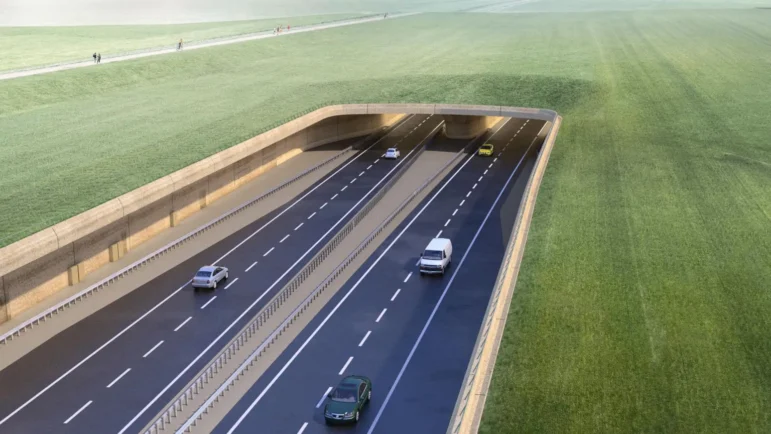LONDON – The Stonehenge tunnel saga has been ongoing for years since it was first approved in November 2020. The United Nations Educational, Scientific and Cultural Organization (UNESCO) had voiced concerns about the construction, and governmental inspectors reported it would cause “permanent, irreversible harm” to the Stonehenge area. UNESCO even threatened to strip the prehistoric monument of its World Heritage Site status and place it on its “World Heritage in Danger” list if the plan proceeded.
Despite objections and concerns, National Highways stated that the tunnel would reduce journey times and alleviate traffic issues while assuring plans would remove the road from the landscape’s view.
The new Labour government appears to have stopped the project permanently, with Chancellor Rachel Reeves stating that Transport Secretary Louise Haigh had decided not to “move forward” with the tunnel project.
The Wild Hunt has published a number of updates on the proposed Stonehenge tunnel in the last couple of years. Since planning permission for the tunnel on environmental grounds was overturned in July 2021, National Highways has spent £5.25 million on publishing new documentation relating to its plans for Stonehenge, including environmental documentation.
The saga was so complicated, controversial, and seemingly eternal that National Highways even released a video explaining it.
In the penultimate chapter of the saga that began earlier this year in February, it appeared that the A303 had surmounted its last legal hurdle to begin construction of National Highways’ £1.7bn Stonehenge Tunnel. However, a new challenge was quickly filed, and in May, the Court of Appeal upheld that the project had to be halted.
The campaign group Save Stonehenge World Heritage Site (SSWHS) had opposed the Development Consent Order (DCO), arguing that the government had not considered the risk to the Stonehenge monument, had not assessed the climate impact of the scheme, and had not properly evaluated alternative routes that would bypass the site without the need for tunneling.
Justice Holgate initially dismissed the group’s case, stating that its points were “unarguable.” However, SSWHS has now learned that the Court of Appeal has upheld its challenge against this ruling.
National Highways expressed its disappointment, saying, “We are hugely disappointed by this decision, which will cause more delays to this scheme as the next stage of the legal process unfolds.”

The proposed A303 tunnel project under Stonehenge. [Source: National Highways
Despite the Court of Appeal’s decision, the project was not canceled but indefinitely delayed.
“This extra legal process will delay the start of our preliminary works, and we’ll need to adjust the whole main works program accordingly,” National Highways said. “We don’t know what that will look like yet because we don’t know the extent of the delay.
“We can’t determine the length of the legal process, and we will need to work closely with the Department for Transport and our legal teams to understand our next steps.”
However, the project now seems dead. In a policy paper published on July 29, 2024, the government explained that they are canceling the A303 Stonehenge tunnel and the A27 schemes due to their low value and “unaffordable commitments which would have cost £587 million next year.” Transport Secretary Grant Shapps had given the formal approval in 2023 via a Development Consent Order for work to start on the A303 Amesbury to Berwick Down (Stonehenge) scheme.
Wiltshire Council, a supporter of the project, expressed that it was “extremely dismayed and disappointed” following the UK government’s cancellation of the Stonehenge highway tunnel scheme. Council leader Richard Clewer stated, “These improvements are needed now to ease traffic congestion on the A303, reduce traffic in our communities, and ensure economic growth in Wiltshire, unlocking jobs and investment in the wider south-west region.”
Before the recent election in July, then-candidate and now-Prime Minister Keir Starmer appeared to be lukewarm about the scheme. “I think the current plan is evidence of how long infrastructure projects take under this government. We’ve got to change that,” Keir said while campaigning. “We’ll have to wait for the court hearing, but then we’ll review after that… I want to see what the court actually says about it first because it’s now a decision from the court. But something has got to be done because the traffic situation there is intolerable.”
Approximately £160 million has already been spent on the highway project, including the installation of the power supply from the A360 road to the tunnel site.
English Heritage, which manages Stonehenge, said in a statement that it “has been a strong supporter of the tunnel project, which would reunite the ancient landscape and allow more people to explore and enjoy this remarkable site.” It added, “Difficult decisions have to be made regarding public spending, and we will seek further dialogue with the government to find a solution for one of the country’s most important and iconic sites.”
“This is a vindication of all the work of so many people over so many years from supporters around the world,” SSWHS head John Adams said. “National Highways’ misguided project was called out for what it was: low value and unaffordable. It was also highly damaging.”
Last week, UNESCO removed Stonehenge from its list of endangered sites.
The Wild Hunt is not responsible for links to external content.
To join a conversation on this post:
Visit our The Wild Hunt subreddit! Point your favorite browser to https://www.reddit.com/r/The_Wild_Hunt_News/, then click “JOIN”. Make sure to click the bell, too, to be notified of new articles posted to our subreddit.